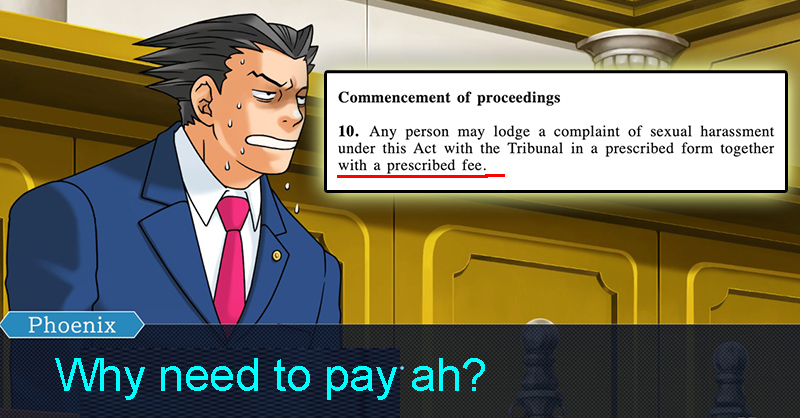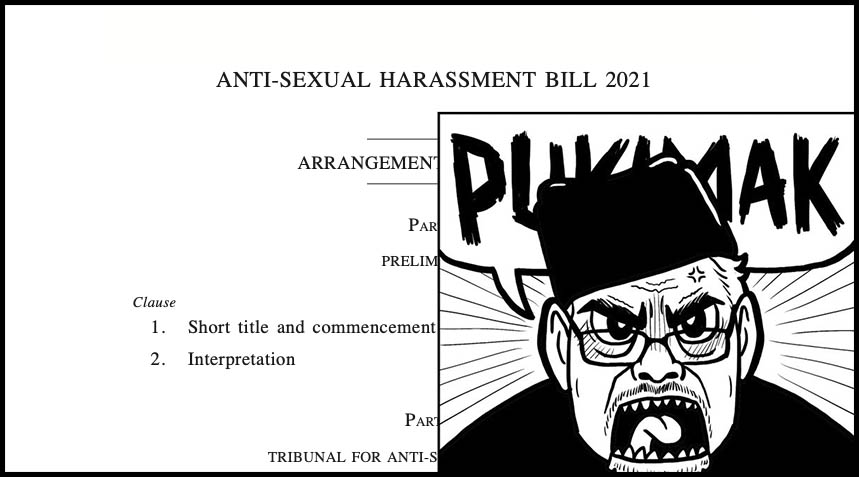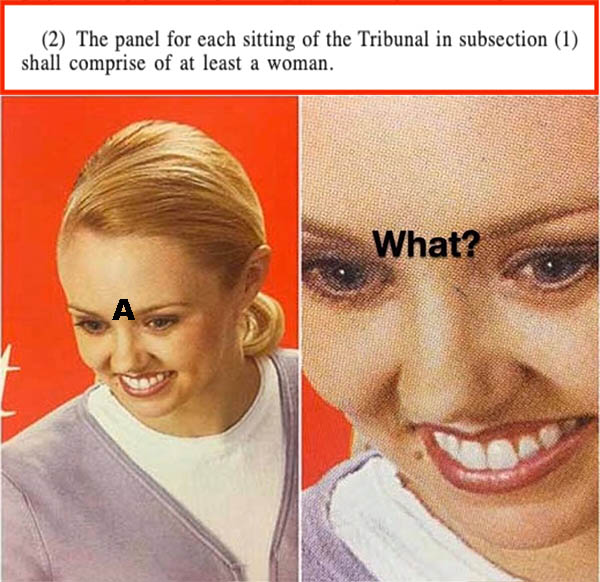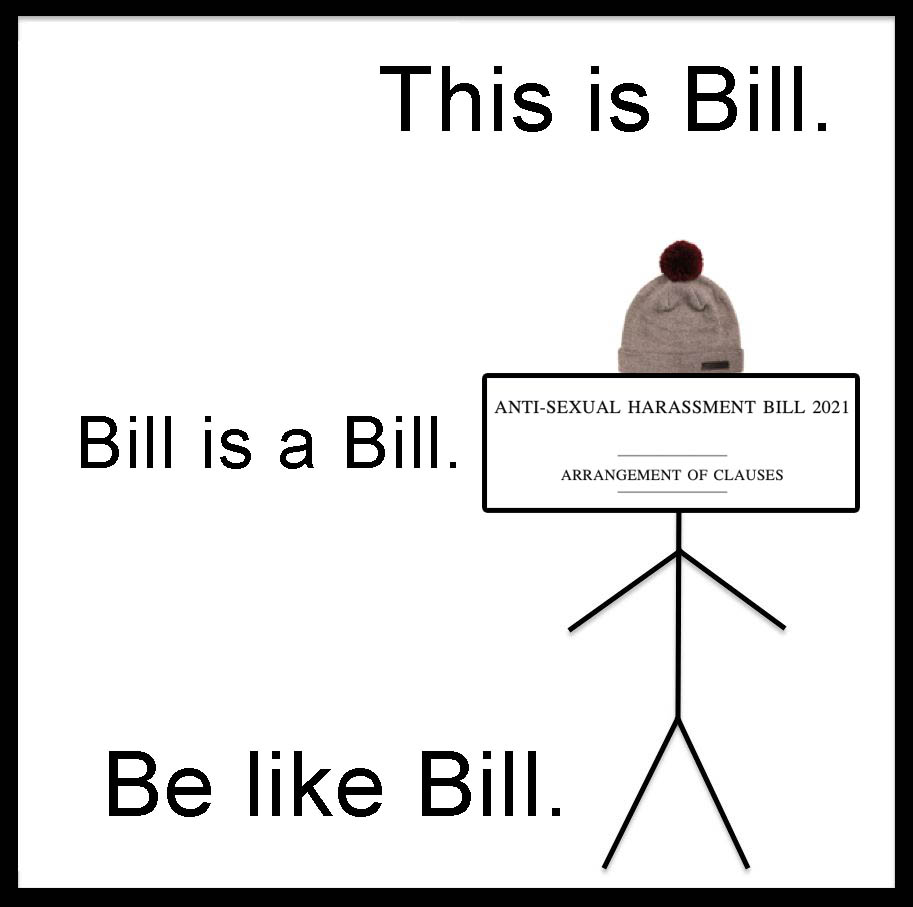Fee to file report? 5 weird things we found in Msia’s new Anti-Sexual Harassment Bill

- 73Shares
- Facebook54
- Twitter4
- LinkedIn4
- Email4
- WhatsApp7
While Malaysia’s laws on sexual violence are pretty clear-cut, our laws on sexual harassment are… not. For now, there are sections within the Penal Code (we’d make a joke but that might be harassment) as well as the Employment Act that can address it, there are many limitations such as the cost and time of going through court and the vagueness of what sexual harassment can be.
So, the recent passing of the Anti-Sexual Harassment Bill in Dewan Rakyat was seen as a milestone by NGOs and certain politicians, but most people would probably remember it as the time Pasir Salak MP Tajuddin Abdul Rahman allegedly (and ironically) used the P-word in parliament.

On the Bill itself, the news reports mainly point to compensation of up to RM250k to the victim and issuing them a public apology, but when we looked into the Bill itself, certain questions immediately pop up:
- Did you know you need to pay a fee to make a complaint?
- What’s the difference between a tribunal and court?
- How do you make a public apology? – Put an ad in the newspaper?
So we got in touch with the Anti-Sexual Harassment (ASH) Advocacy Group who’ve been consulting with the ministers working on this Bill to further understand how it’ll work. You can read or download the Bill here, as well as the current amendments here. Protip: Open them side by side so it’s easier to refer.
1. Both parties don’t need a lawyer
Just to be clear, this only applies to incidents of sexual harassment, which is currently defined within the Bill as:

Other forms of sexual violence will still fall under existing laws and will still go through the police and court system.
Essentially, the Bill allows the creation of a Tribunal which will receive, judge, and enforce any complaints of sexual harassment they receive. Very simply, a tribunal has the ability to make judgements and enforce compensation, but only within their legal scope. Other examples of tribunals are the Industrial Court and the Tribunal for Consumer Claims.
One of the main advantages of a tribunal is that it doesn’t involve the courts, meaning it can be faster and cheaper since you don’t need to wait for court dates or hire a lawyer.

However, this means that it’s up to the victim and accused harasser to present their respective case to the tribunal, or to have a friend or guardian do it on their behalf if they’re a minor or disabled.
“[Existing] legislation don’t provide a comprehensive, affordable and easily accessible remedy for victims … The ASH Bill is envisioned by the government to be a standalone legislation addressing Sexual Harassment, filling in gaps of existing laws addressing sexual harassment.” – ASH Advocacy Group, to CILISOS
Not just that, the decision from the Tribunal is considered final; so unlike the court system you cannot make appeals with one exception – if either party feels there’s a serious irregularity affecting the award made by the Tribunal. In this case, it will be referred to the High Court, but you can read more about it in Section 23 of the Bill.
2. There’s actually a fee for lodging complaints

The Bill also mentions that there is a “prescribed fee” that accompanies the complaint form. The amount as well as what happens when someone is unable to afford it isn’t elaborated on, but the ASH Advocacy Group says that it’ll likely be fleshed out in future guidelines or regulations.
“[The] ASH advocacy group hopes (and will encourage the government) that the cost be kept low, and there be a mechanism available to allow those who cannot afford the fee to still lodge a complaint.” – ASH Advocacy Group
In fact, the group also mentions there are other factors that will need to be considered, such as methods to file complaints, available languages, and how soon a complaint can be processed and the hearing dates arranged.
3. You cannot file complaints for older cases

An amendment to the original Bill now indicates that complaints can only be lodged for incidents that happen after the Act has gone into operation; meaning that, for now, the police and the courts are still the only option.

If you’re wondering how the word ‘Bill’ can suddenly become “Act”, here’s an article explaining how they work. Otherwise, the TL;DR is that the passing of the Bill is only the first step towards it becoming law (the “Act” or “Akta”) – it still has to go through the Senate, receive an Assent from the Agong, and be gazetted before it can be enforced.
In other words, it might take a while.
But even after it’s gone into operation, there may be a time limit for victims to file a complaint. The Tribunal is still subject to the Limitation Act; and the ASH Advocacy Group told us that, while it isn’t clear yet, a victim would have up to 6 years from the time of the incident to file a complaint.
4. There is a weird stipulation for the Tribunal to “comprise of at least a woman”

It’s quite understood that both men and women can be victims and perpetrators of sexual harassment, so it also makes sense that the Tribunal should consist of both men and women. But when we read through the Bill, we thought the wording of this particular clause was kinda… not woke.
In the end, it seems like this is a case of legal/legislative writing with good intentions but not-so-good wording:
This clause was drafted as a safeguard to prevent a ‘manel’ – i.e. a panel of the Tribunal constituting only men … This (an all-male panel) unfortunately is not uncommon in Malaysia.
However, the language should be revised and amended to ensure intersectional and diverse representation of members in the tribunal…” – ASH Advocacy Group
The group is also campaigning for further diversity (such as race) within the Tribunal’s members to better represent the different communities within Malaysia, as well as ensuring that its officials understand concepts of equality and non-discrimination.
5. We don’t know how a public apology is supposed to happen
The three penalties that are usually highlighted are the compensation payment of up to RM250k, a public apology, and up to 2 years in prison if the guilty party doesn’t comply with either of the above. There are some additional nuances such as the amount being doubled if the compensation payment isn’t made within 30 days, but you can read all of that in Clause 21 of the Bill.
The part on fines is pretty straightforward but, if you think about it, how would a public apology work? Like, would they have to put an ad in the papers, or be paraded through the town with shame bells a-ringing?

The Bill itself mentions that the guilty party would have to “publish a statement of apology to the complainant in any manner as specified in the order”. But now that seems to lead to a privacy concern, since the tribunal sessions are not open to the public and it’ll be hard apologizing without naming names. But for now, it seems that those will be addressed in the regulations that will come later:
“All these are specifics which are not addressed by the Bill. We believe the Ministry of Women, Family and Community Development is planning to draft a regulation addressing the finer details – the ASH Bill provides the Minister with the power to make regulations which are necessary in respect of the Tribunal.
The ASH Advocacy Group is looking forward to working with the Ministry to ensure that fair and victim-sensitive regulations are enacted.” – ASH Advocacy Group
There are many more unanswered questions
At this point, many of the questions we’ve highlighted such as…
- Victim trauma and safety when facing their attacker in (and outside) the Tribunal
- What constitutes a false (frivolous or vexatious) complaint;
…will still not have a solid answer for the time-being.

It’s important to note that, at this point, the Bill isn’t final. There might still be changes made to certain clauses, and the ministry will still be fine-tuning how it’ll actually work through further regulations and guidelines. It’s also likely that, over time, regulations will be changed or affected by earlier decisions made by the Tribunal – just like with precedents in the regular courts.
But what’s important is that this Bill will fill in the gaps in our laws when it comes to sexual harassment, providing everyone with a faster, more accessible, and cheaper way to set things right again.
ASH Advocacy Group members who contributed responses to this article are: Chang Mei Yen, Young Women Making Change; Daniella Zulkifili, Association of Women Lawyers; 3. Thilaga, Justice for Sisters.
- 73Shares
- Facebook54
- Twitter4
- LinkedIn4
- Email4
- WhatsApp7



